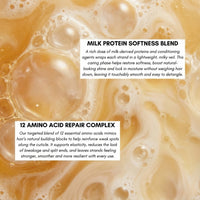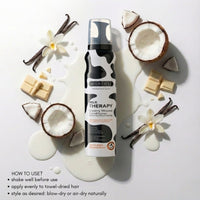Strategies for Healthy Hair and Hair Growth
Posted by MORFOSE COSMETICS

Your hair is more than just a part of your appearance; it's a reflection of your overall health and well-being. Whether you're dealing with hair loss or simply aiming to promote growth and maintain healthy locks, understanding the factors that influence your hair's growth cycle, identifying potential causes of hair loss, incorporating proper nutrition, and adopting hair-friendly lifestyle habits are essential steps in achieving the beautiful, luscious hair you desire. In this comprehensive guide, we'll explore these strategies to help you on your journey to healthier, more vibrant hair.
Understanding the Hair Growth Cycle
Before diving into prevention and treatment, it's crucial to grasp the basics of the hair growth cycle. Hair goes through a continuous cycle of growth, rest, and shedding. There are three main phases:
1. Anagen Phase
This is the active growth phase, lasting two to seven years on average. During this time, your hair follicles produce new cells, resulting in longer hair.
2. Catagen Phase
The transition phase, which lasts for a few weeks. Hair growth slows, and the follicle begins to shrink.
3. Telogen Phase
This is the resting phase, lasting about three months. Old hair is shed, making way for new hair to grow.
Understanding this cycle helps you appreciate the importance of consistency in hair care routines.
The Causes of Hair Loss
Hair loss can occur for various reasons, and identifying the cause is key to finding the right solution. Some common causes include:
- Genetics (Androgenetic Alopecia): If hair loss runs in your family, you may be genetically predisposed to it.
- Hormonal Changes: Hormonal shifts due to pregnancy, menopause, or thyroid issues can affect hair growth.
- Medical Conditions: Conditions like alopecia areata, scalp infections, or certain autoimmune diseases can lead to hair loss.
- Nutritional Deficiencies: A lack of essential nutrients, particularly iron, biotin, and protein, can weaken hair.
- Stress: High-stress levels can contribute to hair loss, so stress management is crucial.
Nutritional Tips for Hair Health
Nutrition plays a vital role in hair health and growth. Here are some dietary tips to support your locks:
- Protein: Hair is primarily made of protein, so ensure you're getting enough lean protein sources like fish, lean meats, and legumes.
- Iron: Iron deficiency can lead to hair loss. Incorporate iron-rich foods like spinach, lentils, and red meat into your diet.
- Omega-3 Fatty Acids: These promote hair elasticity and shine. Include fatty fish, flaxseeds, and walnuts in your meals.
- Vitamins and Minerals: Consume foods rich in vitamins A, C, and E, as well as zinc and biotin for healthy hair.
Lifestyle Habits That Promote Hair Growth
Your lifestyle choices can significantly impact your hair's health and growth. Here are some habits to adopt:
- Stress Management: Practice relaxation techniques like yoga, meditation, or deep breathing to reduce stress levels.
- Regular Exercise: Physical activity improves blood circulation, which delivers nutrients to your hair follicles.
- Adequate Sleep: Aim for 7-9 hours of quality sleep per night to support overall health, including your hair.
- Gentle Hair Care: Avoid harsh treatments, excessive heat styling, and tight hairstyles that can damage your hair.
By understanding your hair's growth cycle, identifying potential causes of hair loss, ensuring proper nutrition, and adopting hair-friendly lifestyle habits, you can take proactive steps to promote healthy hair and minimize hair loss. Morfose offers a range of hair care products formulated to support your hair's well-being, ensuring it remains strong, shiny, and beautiful. Remember that consistency is key, and with time and care, you can achieve the vibrant hair you've always wanted.

Lifestyle Changes for Stronger, Thicker Hair
Your hair is not just a reflection of your genetics and hair care routine; it's also greatly influenced by your lifestyle. Making the right lifestyle changes can play a significant role in maintaining stronger, thicker hair. In this guide, we'll explore key lifestyle adjustments, including stress reduction techniques, the impact of exercise on blood circulation, the importance of sleep and rest, and how to avoid hair-damaging habits. These changes can contribute to healthier and more vibrant hair.
Stress Reduction Techniques for Hair Health
Stress can take a toll on your overall well-being, including the health of your hair. When you're stressed, your body produces hormones that can lead to hair thinning and shedding. Incorporating stress reduction techniques into your daily life can make a noticeable difference:
- Meditation and Mindfulness: Engage in daily meditation or mindfulness practices to calm your mind and reduce stress levels.
- Yoga: Yoga not only reduces stress but also improves blood circulation, which is essential for healthy hair follicles.
- Deep Breathing: Practice deep breathing exercises to relax your body and mind. This can be done anywhere, anytime.
Exercise and Blood Circulation: Their Impact on Hair
Regular exercise offers numerous health benefits, and one of them is improved blood circulation. Good circulation ensures that hair follicles receive an adequate supply of nutrients and oxygen, promoting hair growth:
- Cardiovascular Exercise: Activities like jogging, swimming, and cycling can enhance blood flow to your scalp and hair follicles.
- Scalp Massages: Gentle scalp massages stimulate blood circulation and promote relaxation.
- Strength Training: Building muscle through strength training can also have a positive impact on your overall health, including your hair.
Sleep, Rest, and Hair Growth
Adequate sleep and rest are essential for your body's repair and rejuvenation, including the growth of strong, healthy hair:
- Quality Sleep: Aim for 7-9 hours of quality sleep per night to support hair growth and overall health.
- Consistent Sleep Schedule: Maintain a consistent sleep schedule to regulate your body's internal clock.
- Avoiding Sleep Disruptors: Limit caffeine and electronic device use before bedtime to ensure restful sleep.
Avoiding Hair-Damaging Habits
Certain habits can be detrimental to your hair's health. Identifying and avoiding these habits can prevent damage and hair loss:
- Heat Styling: Excessive use of hot styling tools can weaken and damage your hair. Use them sparingly and always use a heat protectant.
- Tight Hairstyles: Wearing tight hairstyles like braids, ponytails, or buns regularly can lead to hair breakage and loss.
- Chemical Treatments: Over-processing your hair with chemicals, such as perms and relaxers, can weaken its structure.
By incorporating these lifestyle changes into your daily routine, you can support the health and strength of your hair. Morfose offers a range of hair care products designed to complement your efforts in achieving thicker, healthier hair. Remember that consistency is key, and over time, these lifestyle adjustments can lead to noticeable improvements in the thickness and quality of your hair.



